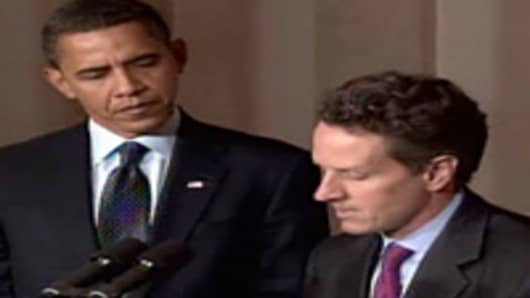Businesses that deal in the production of renewable energy should also take note: The framework would make the tax credit for the production of renewable electricity permanent, "in order to provide a strong, consistent incentive to encourage investments in renewable energy technologies like wind and solar."
Special perks for small business and entrepreneurs
Secretary Geithner and President Obama hope the proposed framework will ease the burden of taxes on American small businesses.
"We want to cut taxes on investment in and by small businesses, and we want to simplify the tax system for small businesses so that they can devote more of their earnings to investment and job creation and less to tax compliance," Geithner said.
So far, experts seem optimistic about what the plan could mean to small businesses in America.
"The president's tax reform plan announced today is exactly what small business owners have been asking for," says John Arensmeyer, founder and CEO of Small Business Majority, a small-business advocacy nonprofit. "It will create a more level financial playing field for small and large firms, promoting healthy competition that stimulates the economy."
Specifically, here's what the plan proposes:
"Allow small businesses to expense up to $1 million in investments." Right now, small businesses can expense company-related investments of up to $500,000. But under the proposed framework, small businesses would be allowed to expense up to $1,000,000.
"Allow cash accounting on businesses with up to $10 million in gross receipts." Under current tax code, small businesses that make less than $5 million in gross receipts are allowed to use a cash accounting system, as opposed to an accrual accounting system, which is notoriously complex. The president suggests raising the threshold for cash accounting to $10 million.
"Double the deduction for start-up costs." Currently, entrepreneurs can deduct $5,000 from their start-up expenses. The president proposes doubling that deduction to $10,000.
"Reform and expand the health insurance tax credit for small businesses." Initially, businesses could qualify for the Affordable Care Act credit if it had less than 25 employees. Many saw that as a job-killing rule. The new proposal raises the number to 50 employees.
Making the tax code simpler
For many small businesses, the cost of tax compliance is extremely expensive. In 2004, for example, nearly one out of ten small businesses spent over $5,000 in tax compliance and more than 11 percent devoted upwards of 500 hours to compliance. A recent National Federation of Independent Business (NFIB) study that found that four of the top 10 small-business problems were tax-related.



